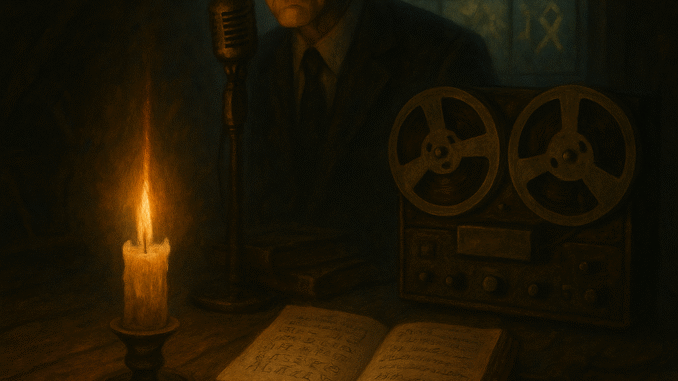
They were found buried beneath dust and silence in a Montreal attic—four battered notebooks, a box of reel-to-reel tapes, and a single candle burned to the wick. What they contained would stun even the most seasoned Leonard Cohen disciples. The scrolls, inscribed with verses and cryptic symbols, suggest Cohen wasn’t just writing poetry and music. He was building a gospel—his own coded testament, laced with prophecy, despair, redemption, and one final song he never sang.
The materials, believed to date back to Cohen’s reclusive period between 1996 and 2001—after The Future and before Dear Heather—have been dubbed “The Lost Scrolls” by archivists. In them, he writes in a blend of Biblical cadence, Kabbalistic mystery, and the raw ache of a man who believed the divine was as close as the gutter outside his window. Some verses match no known song or poem, while others read like fragmented prayers or codes to unlock something deeper.
Among the scrolls is a curious reference to “The Voice in the Sand,” a work scholars can’t locate in any of his known discography or archives. Paired with a drawing of a desert-wrapped figure holding a broken microphone, many now believe Cohen envisioned a final, messianic track—something apocalyptic, unfinished, or purposely hidden from the world. The mystery has ignited frenzied speculation across literary, religious, and musical circles
But the scrolls are only half the story. The reel-to-reel tapes—eight in total—reveal raw, unpolished recordings of Cohen murmuring new lyrics over spectral organ chords. Unlike his usual gravel-voiced delivery, he sings in a haunting whisper, as though addressing something—or someone—unseen. In one eerie track, dubbed Jericho Keys, Cohen repeats the line, “The gates will fall for the poet who kneels,” over and over. Another tape simply contains six minutes of silence, broken only by the faint sound of church bells and breathing.What’s most unnerving is Tape Seven. At the end of a solemn poem about exile, Cohen suddenly stops, laughs softly, and says: “They won’t understand this now—but they will when the last candle dies. That’s when the song will find its voice.” Analysts have interpreted this as a cryptic reference to his own death—or possibly the moment of collective reckoning he foresaw in his more apocalyptic writings.The Cohen estate, though tight-lipped, has confirmed the materials are authentic. Yet they’ve refused to release full contents to the public, citing “unresolved spiritual matters.” One anonymous insider claims the scrolls contain predictions—coded in Hebrew numerology—about modern political events, media collapse, and the eventual return of a forgotten melody “that will reopen the temple within.”Cohen’s longtime backup vocalist Sharon Robinson reportedly burst into tears upon hearing fragments of the scrolls. “He told us for years he was working on something secret,” she said in an interview. “But we thought it was just another album. This… this feels more like scripture. It’s terrifying and beautiful.” Even devout fans are divided—some see it as poetic myth-making, while others are convinced Cohen received some kind of spiritual transmission.As the world rediscovers his words through this eerie posthumous gospel, questions multiply. Why did Cohen hide this work? Was it meant to be released after a certain global moment? Or was it simply too personal, too prophetic, for even him to face while alive? Fans on Reddit and TikTok have already started calling it “Leonard’s Book of Revelation.”And what of the Last Song? Many believe it’s still unreleased, hidden somewhere in the scrolls’ verses or buried in a private vault in Hydra, where Cohen spent many of his early years. One theory posits the melody is encrypted in a musical scale based on the Hebrew alphabet found at the end of Scroll III. Another suggests the song was never meant to be heard—only imagined by those ready to receive it.A growing movement now calls for The Gospel According to Leonard to be canonized into Cohen’s official body of work. Pilgrims have begun leaving candles, flowers, and pages from the scrolls outside his Montreal home. A mural nearby now bears the words: “He gave us Hallelujah. He kept the Revelation.”And still, the candle flickers. Somewhere, perhaps, the last song waits—for the world to listen not with ears, but with soul.

Leave a Reply